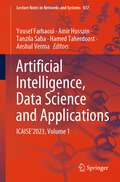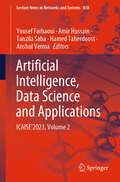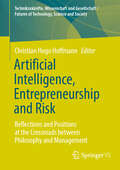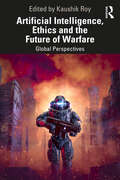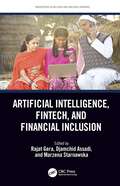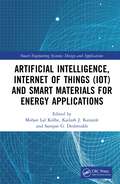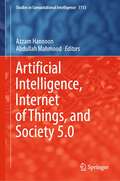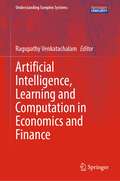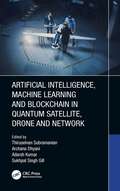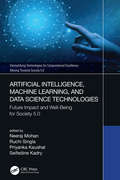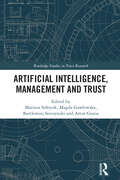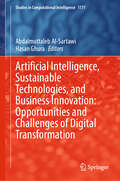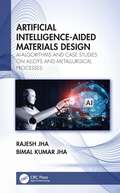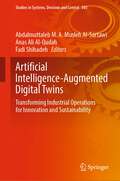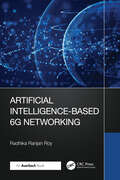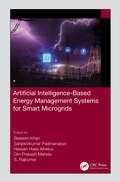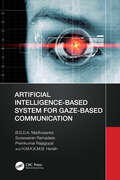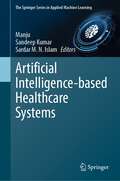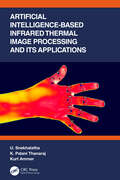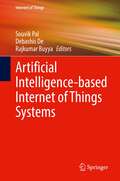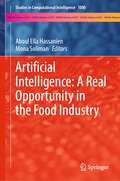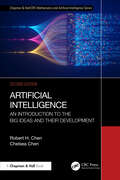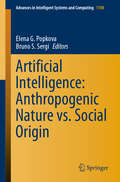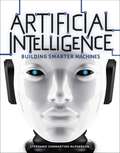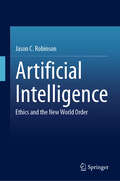- Table View
- List View
Artificial Intelligence, Data Science and Applications: ICAISE’2023, Volume 1 (Lecture Notes in Networks and Systems #837)
by Amir Hussain Anshul Verma Yousef Farhaoui Tanzila Saba Hamed TaherdoostThis book is to provide a comprehensive reference for professionals in the field of data science and applications: artificial intelligence, big data, IoT, and blockchain. In summary, this book is expected to function as a helpful resource and manual, enabling readers to navigate the intricate domain of artificial intelligence, the Internet of things (IoT), and blockchain in smart environments. This book covers many topics related to integrating AI, IoT, blockchain, and smart environments. It begins by laying a solid foundation, introducing each technology's fundamental concepts and principles. Subsequent chapters explore applications and real-world use cases, demonstrating how AI, IoT, and blockchain can effectively address critical challenges within data science and applications.
Artificial Intelligence, Data Science and Applications: ICAISE’2023, Volume 2 (Lecture Notes in Networks and Systems #838)
by Amir Hussain Anshul Verma Yousef Farhaoui Tanzila Saba Hamed TaherdoostThis book is to provide a comprehensive reference for professionals in the field of data science and applications: artificial intelligence, big data, IoT, and blockchain. In summary, this book is expected to function as a helpful resource and manual, enabling readers to navigate the intricate domain of artificial intelligence, the Internet of things (IoT), and blockchain in smart environments. This book covers many topics related to integrating AI, IoT, blockchain, and smart environments. It begins by laying a solid foundation, introducing each technology's fundamental concepts and principles. Subsequent chapters explore applications and real-world use cases, demonstrating how AI, IoT, and blockchain can effectively address critical challenges within data science and applications.
Artificial Intelligence, Entrepreneurship and Risk: Reflections and Positions at the Crossroads between Philosophy and Management (Technikzukünfte, Wissenschaft und Gesellschaft / Futures of Technology, Science and Society)
by Christian Hugo HoffmannThis book embarks on a thought-provoking journey that seeks to illuminate the intricate connections between the dynamic realms of AI, Entrepreneurship and Risk Management. This book illuminates the philosophical foundations of AI, examines the fundamental beliefs surrounding AI's nature, and its effects for the human condition. Drawing on the works of eminent philosophers, economists and business leaders alike, the authors of this volume engage in inspirational discussions on ethics, philosophy of technology, and the potential societal ramifications of advancing AI technologies. By grounding the exploration in philosophical reflections, the authors set the stage for a comprehensive understanding of AI's role in entrepreneurship and the inherent risks it entails.
Artificial Intelligence, Ethics and the Future of Warfare: Global Perspectives
by Kaushik RoyThis volume examines how the adoption of AI technologies is likely to impact strategic and operational planning, and the possible future tactical scenarios for conventional, unconventional, cyber, space and nuclear force structures. In addition to developments in the USA, Britain, Russia and China, the volume also explores how different Asian and European countries are actively integrating AI into their military readiness. It studies the effect of AI and related technologies in training regimens and command structures. The book also covers the ethical and legal aspects of AI augmented warfare.The volume will be of great interest to scholars, students and researchers of military and strategic studies, defence studies, artificial intelligence and ethics.
Artificial Intelligence, Fintech, and Financial Inclusion (Innovations in Big Data and Machine Learning)
by Djamchid Assadi Rajat Gera Marzena StarnawskaThis book covers big data, machine learning, and artificial intelligence-related technologies and how these technologies can enable the design, development, and delivery of customer-focused financial services to both corporate and retail customers, as well as how to extend the benefits to the financially excluded sections of society.Artificial Intelligence, Fintech, and Financial Inclusion describes the applications of big data and its tools such as artificial intelligence and machine learning in products and services, marketing, risk management, and business operations. It also discusses the nature, sources, forms, and tools of big data and its potential applications in many industries for competitive advantage. The primary audience for the book includes practitioners, researchers, experts, graduate students, engineers, business leaders, and analysts researching contemporary issues in the area.
Artificial Intelligence, Internet of Things (Smart Engineering Systems)
by Lal Kolhe MohanThis reference text offers the reader a comprehensive insight into recent research breakthroughs in blockchain, the Internet of Things (IoT), artificial intelligence and material structure and hybrid technologies in their integrated platform, while also emphasizing their sustainability aspects. The text begins by discussing recent advances in energy materials and energy conversion materials using machine learning, as well as recent advances in optoelectronic materials for solar energy applications. It covers important topics including advancements in electrolyte materials for solid oxide fuel cells, advancements in composite materials for Li-ion batteries, progression of materials for supercapacitor applications, and materials progression for thermochemical storage of low-temperature solar thermal energy systems. This book: Discusses advances in blockchain, the Internet of Things, artificial intelligence, material structure and hybrid technologies Covers intelligent techniques in materials progression for sensor development and energy material characterization using signal processing Examines the integration of phase change materials in construction for thermal energy regulation in new buildings Explores the current happenings in technology in conjunction with basic laws and mathematical models Connecting advances in engineering materials with the use of smart techniques including artificial intelligence, machine learning and Internet of Things (IoT) in a single volume, this text will be especially useful for graduate students, academic researchers and professionals in the fields of electrical engineering, electronics engineering, materials science, mechanical engineering and computer science.
Artificial Intelligence, Internet of Things, and Society 5.0 (Studies in Computational Intelligence #1113)
by Azzam Hannoon Abdullah MahmoodThis book unlike any other previous book provides a platform for scholars and researchers to present the latest insights and findings on the application of artificial intelligence and other sustainable technologies for a human-centric society. It brings together technology with society with special attention given to AI and IoT-related intricacies for a digital economy. It covers a variety of research topics including block ciphers, network marketing for sustainability entrepreneurship and AI, AI and stock trading decisions, digital transformation, knowledge management, chatbot engineering, cybersecurity, and smart metering system. The book is a comprehensive reference work for scholars, academics, policymakers, students, and professionals presenting an overall understanding of AI, its present and future trends, and presents a discourse on important policies and strategies on inclusivity, diversity, bias, accountability, security, metaverse applications of AI, and other technologies such as IoT.
Artificial Intelligence, Learning and Computation in Economics and Finance (Understanding Complex Systems)
by Ragupathy VenkatachalamThis book presents frontier research on the use of computational methods to model complex interactions in economics and finance. Artificial Intelligence, Machine Learning and simulations offer effective means of analyzing and learning from large as well as new types of data. These computational tools have permeated various subfields of economics, finance, and also across different schools of economic thought. Through 16 chapters written by pioneers in economics, finance, computer science, psychology, complexity and statistics/econometrics, the book introduces their original research and presents the findings they have yielded.Theoretical and empirical studies featured in this book draw on a variety of approaches such as agent-based modeling, numerical simulations, computable economics, as well as employing tools from artificial intelligence and machine learning algorithms. The use of computational approaches to perform counterfactual thought experiments are also introduced, which help transcend the limits posed by traditional mathematical and statistical tools.The book also includes discussions on methodology, epistemology, history and issues concerning prediction, validation, and inference, all of which have become pertinent with the increasing use of computational approaches in economic analysis.
Artificial Intelligence, Machine Learning and Blockchain in Quantum Satellite, Drone and Network
by Adarsh Kumar Sukhpal Singh Gill Thiruselvan Subramanian Archana DhyaniQuantum computing is a field in which advanced technologies like quantum communication, artificial intelligence and machine learning can be used to secure and speed up connectivity using quantum computers, quantum drones or quantum satellites. This book serve as a foundation for researchers and scientists in this field. Future technologies, such as quantum drone delivery systems, quicker internet and climate change mitigation, will need quantum information processing and quantum computation. This book deeply explores the importance of quantum computing in real-time applications. It may be used as a reference book for students in higher education, including undergraduate and graduate students, as well as researchers. Key features: Provides a clear insight into the Internet of Drones for academicians, postdoc fellows, research scholars, graduate and postgraduate students, industry fellows and software engineers Useful to professionals who seek information about the Internet of Drones, including experts in quantum computing and physics and post-quantum cryptography, as well as data scientists and data analysts Covers quantum computing and security for Unmanned Aerial Vehicles (UAV) or drones which are widely useful for applications such as military, government, and non-government systems Explores futuristic aspects of the Intenet of Drones to improve everyday living for ordinary people
Artificial Intelligence, Machine Learning, and Data Science Technologies: Future Impact and Well-Being for Society 5.0 (Demystifying Technologies for Computational Excellence)
by Neeraj MohanThis book provides a comprehensive, conceptual, and detailed overview of the wide range of applications of Artificial Intelligence, Machine Learning, and Data Science and how these technologies have an impact on various domains such as healthcare, business, industry, security, and how all countries around the world are feeling this impact. The book aims at low-cost solutions which could be implemented even in developing countries. It highlights the significant impact these technologies have on various industries and on us as humans. It provides a virtual picture of forthcoming better human life shadowed by the new technologies and their applications and discusses the impact Data Science has on business applications. The book will also include an overview of the different AI applications and their correlation between each other. The audience is graduate and postgraduate students, researchers, academicians, institutions, and professionals who are interested in exploring key technologies like Artificial Intelligence, Machine Learning, and Data Science.
Artificial Intelligence, Management and Trust (Routledge Studies in Trust Research)
by Mariusz Sołtysik Magda Gawłowska Bartlomiej Sniezynski Artur GuniaThe main challenge related to the development of artificial intelligence (AI) is to establish harmonious human-AI relations, necessary for the proper use of its potential. AI will eventually transform many businesses and industries; its pace of development is influenced by the lack of trust on the part of society. AI autonomous decision-making is still in its infancy, but use cases are evolving at an ever-faster pace. Over time, AI will be responsible for making more decisions, and those decisions will be of greater importance. The monograph aims to comprehensively describe AI technology in three aspects: organizational, psychological, and technological in the context of the increasingly bold use of this technology in management. Recognizing the differences between trust in people and AI agents and identifying the key psychological factors that determine the development of trust in AI is crucial for the development of modern Industry 4.0 organizations. So far, little is known about trust in human-AI relationships and almost nothing about the psychological mechanisms involved. The monograph will contribute to a better understanding of how trust is built between people and AI agents, what makes AI agents trustworthy, and how their morality is assessed. It will therefore be of interest to researchers, academics, practitioners, and advanced students with an interest in trust research, management of technology and innovation, and organizational management.
Artificial Intelligence, Sustainable Technologies, and Business Innovation: Opportunities and Challenges of Digital Transformation (Studies in Computational Intelligence #1171)
by Abdalmuttaleb Al-Sartawi Hasan GhuraThis book offers a comprehensive exploration of the symbiotic relationship between artificial intelligence, sustainable technologies, and business innovation. Innovation has always been the main engine of an improved standard of living throughout history. However, the process of innovation can be highly disruptive as it makes more conventional technologies obsolete This book presents trendy and important topics such as open innovation and sustainability of Islamic Banks, Fintech, financial inclusion, IOT, business intelligence capabilities, innovation through AI, circular economy practices, and trends in cybersecurity. The reader-base from diverse backgrounds, including scholars, industry experts, policymakers, and students, engage with the perspectives and topics discussed in this book. By understanding the opportunities and challenges of this dynamic landscape, the authors can collectively work together to shape a future where technology and sustainability co-exist to drive positive change.
Artificial Intelligence-Aided Materials Design: AI-Algorithms and Case Studies on Alloys and Metallurgical Processes
by Rajesh Jha Bimal Kumar JhaThis book describes the application of artificial intelligence (AI)/machine learning (ML) concepts to develop predictive models that can be used to design alloy materials, including hard and soft magnetic alloys, nickel-base superalloys, titanium-base alloys, and aluminum-base alloys. Readers new to AI/ML algorithms can use this book as a starting point and use the MATLAB® and Python implementation of AI/ML algorithms through included case studies. Experienced AI/ML researchers who want to try new algorithms can use this book and study the case studies for reference. Offers advantages and limitations of several AI concepts and their proper implementation in various data types generated through experiments and computer simulations and from industries in different file formats Helps readers to develop predictive models through AI/ML algorithms by writing their own computer code or using resources where they do not have to write code Covers downloadable resources such as MATLAB GUI/APP and Python implementation that can be used on common mobile devices Discusses the CALPHAD approach and ways to use data generated from it Features a chapter on metallurgical/materials concepts to help readers understand the case studies and thus proper implementation of AI/ML algorithms under the framework of data-driven materials science Uses case studies to examine the importance of using unsupervised machine learning algorithms in determining patterns in datasets This book is written for materials scientists and metallurgists interested in the application of AI, ML, and data science in the development of new materials.
Artificial Intelligence-Augmented Digital Twins: Transforming Industrial Operations for Innovation and Sustainability (Studies in Systems, Decision and Control #503)
by Abdalmuttaleb M. A. Musleh Al-Sartawi Anas Ali Al-Qudah Fadi ShihadehPresently, we stand on the threshold of a technological revolution that will drastically change the way we live, work, and communicate with each other. By the current rate, scope, and complexity, this transformation will be as fundamental for society as any other technological paradigm change from the past. The industries which are more susceptible to change are technologically oriented industries including banking, finance, accounting, and auditing. One of the technological concepts of the technological revolution is the concept of the digital twin.The application of digital twins and AI as paired with Internet of Things technologies makes it possible to solve ESG problems on a completely different level (Li, 2019) for accounting firms and financial institutions. These include recycling on demand, rational energy consumption, smart surveillance cameras for crime tracking, and smart branch parking solutions, monitoring the wear and tear and conditions of financial technology infrastructures.Moreover, numerous researchers and practitioners emphasize the significance of innovating sustainable business models and operations (Geissdoerfer et al., 2018). The digital twin will allow businesses and financial institutions to minimize costs, boost customer service, and find new ways to generate revenue. DTW is accessible now more than ever, and many reputable and innovative companies such as Tesla, Ericsson, and Siemens have adopted it with varying success.Therefore, this book examines the opportunities, challenges, and risks of artificial intelligence-augmented digital twins for financial operations, innovation, and sustainable development. It focuses on AI and digital twin technologies to furnish solutions for the current industrial revolution including the Metaverse. Henceforth, this book aims to encourage authors to submit multi-disciplinary chapters indicating the current scholarly challenges about the applications and potential of artificial intelligence and digital twins in accounting, finance, and banking.
Artificial Intelligence-Based 6G Networking
by Radhika Ranjan RoyArtificial Intelligence-Based 6G Networking focuses exclusively on the upcoming sixth-generation (6G) network and services slated for implementation by 2030. It explores the paradigm shift that is 6G. It discusses the deep integration of computing and communication, supported by artificial intelligence (AI) across network elements like cloud, edge, and terminals. It also examines how AI-native interfaces will permeate various network components, from radio access networks to application servers and databases.Proposing a unified AI-enabled framework for optimizing networks and applications as a single integrated system, the book covers how network service providers can tailor network baselines, reduce noise, and accurately identify issues. The book delves into the potential of AI-driven networks to self-correct, predict, and rectify service degradations proactively, enhancing uptime and troubleshooting efficiency. It outlines the “Connection, Communication, Collaboration, Curation, and Community” framework to enhance network effects, aiding operators in automation, cost reduction, and providing optimal user experiences.Covering topics from MIMO and Massive MIMO to holographic communications, cybersecurity and quantum communications, the book explores cutting-edge technologies shaping the future of 6G networks. It anticipates a future where AI, along with machine learning and deep learning, enables continuous learning, self-optimization, and predictive maintenance, even with full automation, that will be the hallmark of a new era in network connectivity and innovation.
Artificial Intelligence-Based Energy Management Systems for Smart Microgrids
by Baseem KhanModeling and optimization of energy management systems for micro- and mini-grids play an important role in the fields of energy generation dispatch, system operation, protection coordination, power quality issues, and peak demand conflict with grid security. This comprehensive reference text provides an in-depth insight into these topics. This text discusses the use of meta-heuristic and artificial intelligence algorithms for developing energy management systems with energy use prediction for mini- and microgrid systems. It covers important concepts including modeling of microgrid and energy management systems, optimal protection coordination-based microgrid energy management, optimal energy dispatch with energy management systems, and peak demand management with energy management systems. Key Features: Presents a comprehensive discussion of mini- and microgrid concepts Discusses AC and DC microgrid modeling in detail Covers optimization of mini- and microgrid systems using AI and meta-heuristic techniques Provides MATLAB®-based simulations on a mini- and microgrid Comprehensively discussing concepts of microgrids with the help of software-based simulations, this text will be useful as a reference text for graduate students and professionals in the fields of electrical engineering, electronics and communication engineering, renewable energy, and clean technology.
Artificial Intelligence-Based System for Gaze-Based Communication
by Premkumar Rajagopal B.G.D.A. Madhusanka Sureswaran Ramadass H.M.K.K.M.B. HerathThis book focuses on the artificial neural network-based system for gaze-based communication. It covers the feasible and practical collaboration of human–computer interaction (HCI) in which a user can intuitively express tasks using gaze-based communication. It will target the vast applications of gaze-based communication using computer vision, image processing, and artificial intelligence.Artificial Intelligence-Based System for Gaze-Based Communication introduces a novel method to recognize the implicit intention of users by using nonverbal communication in combination with computer vision technologies. A novel HCI framework is developed to enable implicit and intuitive gaze-based intention communications. This framework allows the users to intuitively express their intention using natural gaze cues. The book also focuses on robot caregiving technology, which can understand the user’s intentions using minimal interactions with the user. The authors examine gaze-based tracking applications for the assisted living of elderly people. The book examines detailed applications of eye-gaze communication for real-life problems. It also examines the advantages that most people can handle gaze-based communications because it requires very little effort, and most of the elderly and impaired can retain visual capability.This book is ideally designed for students, researchers, academicians, and professionals interested in exploring and implementing gaze-based communication strategies and those working in the field of computer vision and image processing.
Artificial Intelligence-based Healthcare Systems (The Springer Series in Applied Machine Learning)
by Sandeep Kumar Sardar M. N. Islam ManjuThis book explores new applications in the field of science and technology for healthcare systems. The main focus of this book is to devise smart, efficient and robust solutions for the health care sector to serve the major population of rural areas. Artificial Intelligence-based Healthcare Systems encourages scientists, engineers, and scholars across the multiple disciplines to design smart intelligent innovations on rural healthcare issues and motivate to collaborate multiple ideas to design best solutions. It also helps the readers at various levels of knowledge to further enhance their understanding for new tools and smart solutions.
Artificial Intelligence-based Infrared Thermal Image Processing and its Applications
by Kurt Ammer U. Snekhalatha K. Palani ThanarajInfrared thermography is a fast and non-invasive technology that provides a map of the temperature distribution on the body’s surface. This book provides a description of designing and developing a computer-assisted diagnosis (CAD) system based on thermography for diagnosing such common ailments as rheumatoid arthritis (RA), diabetes complications, and fever. It also introduces applications of machine-learning and deep-learning methods in the development of CAD systems. Key Features: • Covers applications of various image processing techniques in thermal imaging applications for the diagnosis of different medical conditions • Describes the development of a computer diagnostics system (CAD) based on thermographic data • Discusses deep-learning models for accurate diagnosis of various diseases • Includes new aspects in rheumatoid arthritis and diabetes research using advanced analytical tools • Reviews application of feature fusion algorithms and feature reduction algorithms for accurate classification of images This book is aimed at researchers and graduate students in biomedical engineering, medicine, image processing, and CAD.
Artificial Intelligence-based Internet of Things Systems (Internet of Things)
by Debashis De Rajkumar Buyya Souvik PalThe book discusses the evolution of future generation technologies through Internet of Things (IoT) in the scope of Artificial Intelligence (AI). The main focus of this volume is to bring all the related technologies in a single platform, so that undergraduate and postgraduate students, researchers, academicians, and industry people can easily understand the AI algorithms, machine learning algorithms, and learning analytics in IoT-enabled technologies. This book uses data and network engineering and intelligent decision support system-by-design principles to design a reliable AI-enabled IoT ecosystem and to implement cyber-physical pervasive infrastructure solutions. This book brings together some of the top IoT-enabled AI experts throughout the world who contribute their knowledge regarding different IoT-based technology aspects.
Artificial Intelligence: A Real Opportunity in the Food Industry (Studies in Computational Intelligence #1000)
by Aboul Ella Hassanien Mona SolimanThis book emphasizes the latest developments and achievements in AI and related technologies with a special focus on food quality. The book describes the applications, and conceptualization of ideas, and critical surveys covering most aspects of AI for food quality.
Artificial Intelligence: An Introduction to the Big Ideas and their Development (Chapman & Hall/CRC Mathematics and Artificial Intelligence Series)
by Robert H. Chen Chelsea ChenArtificial Intelligence: An Introduction to Big Ideas and their Development, Second Edition guides readers through the history and development of artificial intelligence (AI), from its early mathematical beginnings through to the exciting possibilities of its potential future applications. To make this journey as accessible as possible, the authors build their narrative around accounts of some of the more popular and well-known demonstrations of artificial intelligence, including Deep Blue, AlphaGo and even Texas Hold’em, followed by their historical background, so that AI can be seen as a natural development of the mathematics and computer science of AI. As the book proceeds, more technical descriptions are presented at a pace that should be suitable for all levels of readers, gradually building a broad and reasonably deep understanding and appreciation for the basic mathematics, physics, and computer science that is rapidly developing artificial intelligence as it is today. Features Only mathematical prerequisite is an elementary knowledge of calculus. Accessible to anyone with an interest in AI and its mathematics and computer science. Suitable as a supplementary reading for a course in AI or the History of Mathematics and Computer Science in regard to artificial intelligence. New to the Second Edition Fully revised and corrected throughout to bring the material up-to-date. Greater technical detail and exploration of basic mathematical concepts, while retaining the simplicity of explanation of the first edition. Entirely new chapters on large language models (LLMs), ChatGPT, and quantum computing.
Artificial Intelligence: Anthropogenic Nature vs. Social Origin (Advances in Intelligent Systems and Computing #1100)
by Elena G. Popkova Bruno S. SergiThis book presents advanced research studies on the topic of artificial intelligence as a component of social and economic relations and processes. It gathers research papers from the International Research-to-Practice Conference “The 21st Century from the Positions of Modern Science: Intellectual, Digital and Innovative Aspects” (May 23–24, 2019, Nizhny Novgorod, Russia) and the International Research-to-Practice Conference “Economics of Pleasure: a Science of Enjoying Economic Activities” (October 3–5, 2019, Prague, Czech Republic). Both conferences were organized by the Autonomous Non-Profit Organization “Institute of Scientific Communications” (Volgograd). What sets this book apart from other publications on the topic of artificial intelligence is that it approaches AI not as a technological tool, but as an economic entity. Bringing together papers by representatives of various fields of social and human knowledge, it systematically reflects on various economic, social, and legal aspects of the creation, application, and development of artificial intelligence. Given the multidisciplinary nature of its content, the book will appeal to a broad target audience, including those engaged in developing AI (scientific research institutes and universities), and Industry 4.0 enterprises interested in its implementation, as well as state regulators for the digital economy.
Artificial Intelligence: Building Smarter Machines
by Stephanie Sammartino McPhersonIn 2011 a computer named Watson outscored two human competitors on the TV quiz show Jeopardy! and snagged the million-dollar prize. Watson isn't the only machine keeping up with humans. The field of artificial intelligence (AI) is booming, with drones, robots, and computers handling tasks that once only humans could perform. Such advances raise challenging questions. Do Watson and other computers really think? Can machines acquire self-awareness? Is AI a promising or a dangerous technology? No machine, not even Watson, yet comes close to matching human intelligence, but many scientists believe it is only a matter of time before we reach this milestone. What will such a future look like?
Artificial Intelligence: Ethics and the New World Order
by Jason C. RobinsonThis thought-provoking book explores the most promising and threatening technology imaginable—artificial intelligence (AI) or thinking-machines. Following the shocking release of generative AI (ChatGPT) in 2022, questions about the future of humanity and our role as apex minds have exploded with great urgency. The book contributes uniquely to AI conversations in three main ways. First, it broaches questions often ignored by AI developers and tech-enthusiasts, including corporate responsibility and the role technology plays in the widespread manipulation of cultures for profit and power. Second, it asks big and unanswered questions about the nature of thinking, consciousness, morality, purpose, and the good life, as a means of laying the foundation needed to create a better AI. Third, by framing AI evolution in three unique stages of development—Oz, Feallan, and Adouren—it takes readers far beyond the present horizon of large language models. While being accessible to a wide audience, this book offers a thought-provoking examination of the most pressing questions and risks of AI.
